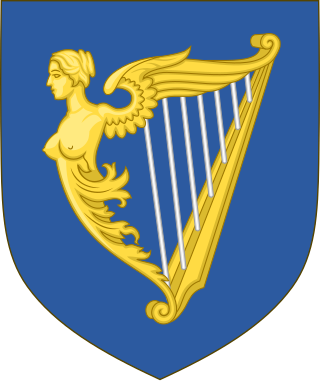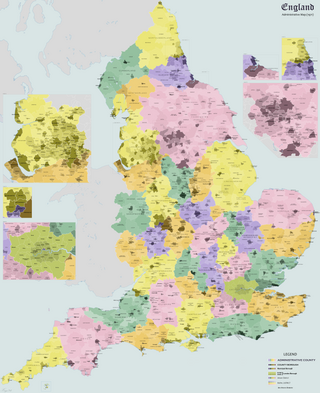
The Irish House of Commons was the lower house of the Parliament of Ireland that existed from 1297 until the end of 1800. The upper house was the House of Lords. The membership of the House of Commons was directly elected, but on a highly restrictive franchise, similar to the unreformed House of Commons in contemporary Great Britain. Catholics were disqualified from sitting in the Irish parliament from 1691, even though they comprised the vast majority of the Irish population.
In the United Kingdom, representative peers were those peers elected by the members of the Peerage of Scotland and the Peerage of Ireland to sit in the British House of Lords. Until 1999, all members of the Peerage of England held the right to sit in the House of Lords; they did not elect a limited group of representatives. All peers who were created after 1707 as Peers of Great Britain and after 1801 as Peers of the United Kingdom held the same right to sit in the House of Lords.

A municipal borough was a type of local government district which existed in England and Wales between 1836 and 1974, in Northern Ireland from 1840 to 1973 and in the Republic of Ireland from 1840 to 2002. Broadly similar structures existed in Scotland from 1833 to 1975 with the reform of royal burghs and creation of police burghs.

An Act to prevent the further Growth of Popery was an Act of the Parliament of Ireland that was passed in 1704 designed to suppress Roman Catholicism in Ireland ("Popery"). William Edward Hartpole Lecky called it the most notorious of the Irish Penal Laws.

The Municipal Corporations Act 1835, sometimes known as the Municipal Reform Act, was an Act of the Parliament of the United Kingdom that reformed local government in the incorporated boroughs of England and Wales. The legislation was part of the reform programme of the Whigs and followed the Reform Act 1832, which had abolished most of the rotten boroughs for parliamentary purposes.

The Municipal Corporations Act (Ireland) 1840, An Act for the Regulation of Municipal Corporations in Ireland, was passed by the Parliament of the United Kingdom on 10 August 1840. It was one of the Municipal Corporations (Ireland) Acts 1840 to 1888.

The Parliamentary Boundaries (Ireland) Act 1832 was an Act of the Parliament of the United Kingdom which defined the boundaries of the 33 parliamentary boroughs which were represented in the United Kingdom House of Commons. They had originally been named in the Acts of Union 1800. Section 12 of the Representation of the People (Ireland) Act 1832, enacted on the same day, specified that the boundaries were to be defined in this separate Act.
Athlone was a parliamentary constituency in Ireland, which from 1801 to 1885 returned one Member of Parliament (MP) to the House of Commons of the United Kingdom of Great Britain and Ireland.
Bandon was a parliamentary constituency representing the town of Bandon in County Cork, Ireland from 1801 to 1885. It elected one Member of Parliament (MP) to the House of Commons of the United Kingdom of Great Britain and Ireland.
Armagh Borough was a constituency represented in the Irish House of Commons, the house of representatives of the Kingdom of Ireland, from 1613 to 1800.

{{Infobox UK legislation | short_title = Representation of the People (Ireland) Act 1868 | type = Act | parliament = Parliament of the United Kingdom | long_title = An Act to amend the Representation of the People in Ireland. | year = 1868 | citation = 31 & 32 Vict. c. 49 | introduced_commons = | introduced_lords = | territorial_extent = [[Ireland] | royal_assent = 13 July 1868 | commencement = | expiry_date = | repeal_date = | amends = | replaces = | amendments = Statute Law Revision Act 1875 | repealing_legislation = Representation of the People Act 1949 | related_legislation = | status = Repealed | legislation_history = | theyworkforyou = | millbankhansard = | original_text = | revised_text = | use_new_UK-LEG = | UK-LEG_title = | collapsed = }}
The UK parliamentary constituency of Seaford was a Cinque Port constituency, similar to a parliamentary borough, in Seaford, East Sussex. A rotten borough, prone by size to undue influence by a patron, it was disenfranchised in the Reform Act of 1832. It was notable for having returned three Prime Ministers as its members – Henry Pelham, who represented the town from 1717 to 1722, William Pitt the Elder from 1747 to 1754 and George Canning in 1827 – though only Canning was Prime Minister while representing Seaford.
Youghal was a parliamentary borough represented in the Irish House of Commons until its abolition on 1 January 1801. It was a corporation with burgesses and freemen.

The Representation of the People (Ireland) Act 1832, commonly called the Irish Reform Act 1832, was an Act of Parliament that introduced wide-ranging changes to the election laws of Ireland. The act was passed at approximately the same time as the Reform Act 1832, which applied to England and Wales.
Events from the year 1748 in Ireland.

The Honorary Freedom of Boroughs Act 1885 was an Act of the Parliament of the United Kingdom that gave the councils of municipal boroughs in England and Wales the power to award the title of honorary freeman to "persons of distinction and any persons who have rendered emininent services to the borough".

The Short Titles Act 1896 is an act of the Parliament of the United Kingdom. It replaces the Short Titles Act 1892.
In Ireland, the term city has somewhat differing meanings in Northern Ireland and the Republic of Ireland.
A bishop's borough or bishop borough was a pocket borough in the Irish House of Commons where the patron who controlled the borough was the bishop for the time being of the diocese of the Church of Ireland whose cathedral was within the borough. All bishops were themselves ex officio members of the Irish House of Lords. Three bishop's boroughs were disenfranchised by the Acts of Union 1800, and their bishops at the time applied for the standard £15,000 compensation due to patrons of disenfranchised boroughs; however, the Commissioners rejected these claims, and awarded the money to the Board of First Fruits. Armagh City, the Archbishop of Armagh's borough, remained enfranchised at Westminster and under the archbishop's control until the Irish Reform Act 1832. Although Cashel and Tuam were originally archbishops' boroughs, they passed to lay patrons in the eighteenth century.
Ministers' money was a tax payable by householders in certain cities and towns in Ireland to fund the local Church of Ireland minister. It was introduced in 1665, modified in 1827, and abolished in 1857. The cities and towns affected were Dublin, Cork, Limerick, Waterford, Drogheda, Kilkenny, Clonmel, and Kinsale. It was levied as a rate of up to one shilling in the pound on the property's rateable value. The valuation, to a maximum of £60, was done by commissioners appointed by the Lord Lieutenant. Churchwardens appointed by the local minister collected ministers' money on the quarter days: Christmas, Lady Day, St John's Day, and Michaelmas. The 1689 Irish Parliament, which the Catholic James II summoned during the Williamite War, abolished minister's money; after James lost the war, William and Mary's 1695 Parliament annulled the 1689 one. A 1723 act provided that, in Dublin, the same valuation could be used both for ministers' money and for calculating cess, a separate local rate used for public works and poor relief. Thereafter, cess rates were often expressed in terms of pence per shilling of minister's money.







